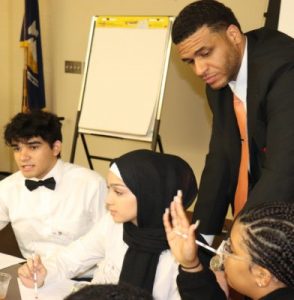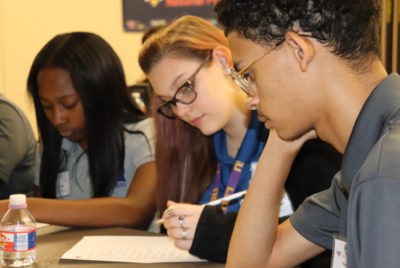High school students from some of the most disadvantaged districts in the United States will soon be able to take UConn classes as part of their curriculum.
That’s thanks to UConn joining a group of other prestigious universities in the National Education Equity Lab, which creates new pathways for low-income students and students of color to advance and demonstrate college-readiness.
The Ed Equity Lab does this by offering talented students from underserved high schools nationwide college credit-bearing online courses in teacher-led high school classrooms, at no cost to students. School districts involved in the program include New York City, Los Angeles, San Diego, San Antonio, Buffalo, and nearby Meriden. Catherine Valentin, a Meriden teacher at Maloney High School, is one of the supervising teachers at Ed Equity Lab.
UConn’s participation in the program begins in spring 2021 as it partners with Yale University to offer “The Science of Happiness” taught by Yale professor Laurie Santos. High school students who complete the class will earn UConn credit through the Early College Experience (ECE) program.
Starting in the fall of 2021, UConn classes taught by its faculty will be offered as part of the program. The details of those classes are still to be determined.
UConn joins an elite group of institutions in the program, including Yale, Cornell University, Howard University, and Harvard University, where the program held its first classes in 2019.
“This partnership provides a great opportunity to introduce students across the country to the UConn brand and provides a great opportunity for us to build relationships with potential UConn students,” says Associate Vice Provost Peter Diplock of the Center for Excellence in Teaching and Learning. “It will help us advance our goals of attracting a more diverse student body from different geographic regions. Access to these courses can be a transformative moment for these students.”

The classes in the Ed Equity Lab program are taught online by university and college professors with the high school students in an asynchronous format, meaning that students can engage with course content in a more flexible manner. In addition, university teaching assistants provide support in a synchronous “real-time” format. The local high school teacher plays an important role as they meet in-person with students, leading discussions and monitoring academic progress.
“The is an education equity effort with the goal to democratize access to higher education,” says Ed Equity Lab Chief of Staff Alexandra Slack. “We connect high quality college courses from institutions like UConn to historically under-resourced high schools serving students who do not typically have access to these opportunities.
“Opening up these opportunities to students across the country provides students with an actual college experience and an opportunity to earn pre-college credit. We are thrilled to be partnering with UConn given their commitment to and experience in the concurrent enrollment space.”
UConn has the oldest concurrent program in the country, the Early College Experience (ECE), which has provided the opportunity for in-state students to earn UConn credit during high school.
“Our legacy in this space made us attractive,” says Brian Boecherer, the director of these programs. “The students in the Ed Equity Lab program might not realize that they are college worthy or that college is an option for them. But they sit in this course and they learn that they can succeed. They can connect to a major, which can connect to a profession, and they are going to see themselves differently.”
The Ed Equity Lab is a nonprofit supported by the Bill & Melinda Gates Foundation, and has supporters from major players in educations, such as former Secretary of Education Arne Duncan and Jenny Rickard, the president and CEO of the Common App.
“Getting involved in this on the ground floor is an important opportunity for UConn, because it is just starting to grow,” says Diplock. “But, just as important from where I sit, we can learn from this experience in different ways and reengineer other things we do.”
Slack and the Ed Equity Lab team are constantly inspired by the feedback they receive from the high school students and teachers.
“Feedback from our scholars and teachers keeps our team motivated,” says Slack. “We hear from our students and teachers just how much the opportunity to take a college course in high school has opened their eyes to what is possible. Students learn about the rigors of college, but also that they can succeed and that they do belong in higher ed.”



